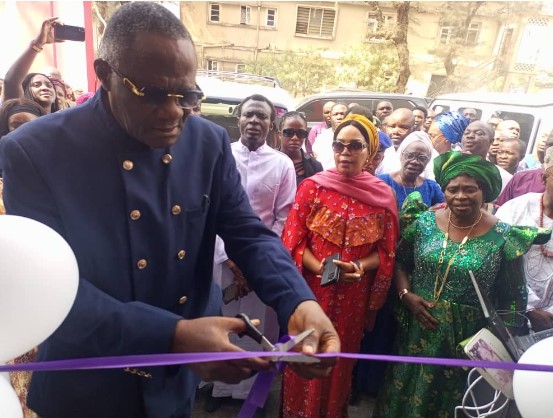The Minister of State for Labour and Employment, Nkeiruka Onyejeocha, has said the Federal Government is working hard to change the present narrative and find lasting solutions to the rising cost of living crisis.
She said though the federal and state governments never envisaged the current realities, the President Bola Tinubu-led administration was working to arrest the situation and ensure normalcy returns.
She said this in Ibadan, the Oyo State capital during the inauguration and dedication of Adamimogo House, which housed the Adamimogo 105.1 FM, The Light Hotel and Event Centre owned by the Planter of Christ Apostolic Church, Adamimogo Grace of Mercy Prayer Mountain Worldwide, Olu Alo.
She urged Nigerians to keep supporting the government with their prayers.
“The federal, state and local governments have found themselves where they never expected with the present situation in the country but we need your prayers to get out of this present position. For us, we will continue to work hard to change the narrative,” the minister was quoted as saying in a statement by the cleric’s Personal Assistant, Deji Ogunbusuyi, on Thursday.
Speaking on the radio station and other investments, the minister said the cleric distinguished himself in providing employment for youths and reducing poverty in the country.
“That is exactly what he has done today. And also, from the seat which I occupy, you are making my job a bit easier, because I know that you are doing all of these to ensure that poverty is reduced and employment is created. I know that many jobs have been created by this and poverty has been reduced.
“So, the Federal Government of Nigeria is excited to say to you to keep doing what you have been doing. You are not only impacting on the people but you are changing the narratives and the government shall be supporting you in any way we can,” she said.
In his response, Alo said his efforts were geared towards impacting the lives of the people, particularly the youth.
“I want to give them the platforms to showcase their God-given talents to better their lots. Whatever position God has placed you, it is to affect the lives of others positively. We should know that we have a limited time to spend on earth,” he said.
He, however, advised the Federal Government to always train youths in various vocations and trades and buy back whatever is produced by them to encourage them.
“This is the model I saw in Turkey. The government there, trains the youth in whatever trade of their interest and buys from them their products. This encourages them to continue in the trade,” he added.
The PUNCH reports that earlier last week, youths and women took to the streets of Minna and Kano to protest what they described as the rising cost of living in the country.
In Niger, a group of women blocked the ever-busy Minna-Bida Road at the popular Kpakungu Roundabout and called on Tinubu to address the problem of ‘hunger in the land’.
Also on Thursday, as a temporary response to the nation’s growing food crisis and the rising cost of commodities, President Bola Tinubu ordered the immediate release of more than 102,000 metric tons of various grain types from the National Food Reserve and the Rice Millers Association of Nigeria.
The Minister of Information and National Orientation, Mohammed Idris, disclosed this to State House correspondents after the last leg of a series of three meetings of the Special Presidential Committee on Emergency Food Intervention at the Aso Rock Villa.
Idris said, “The first one is that the Ministry of Agriculture and Food Security has been directed to release about 42,000 metric tons of maize, millet, garri, and other commodities in their strategic reserve so that these items will be made available to Nigerians; 42,000 metric tons immediately.
“The second one is that we have held meetings with the Rice Millers Association of Nigeria. Those who are responsible for producing this rice and we have asked them to open up their stores.
“They’ve told us that they can guarantee about 60,000 metric tons of rice. This will be made available and we know that that is enough to take Nigerians the next one month to six weeks, perhaps up to two months.”
